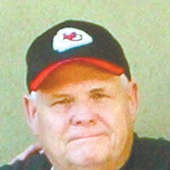A lasting generation
Last Friday, June the 6th, was the 70th anniversary of the D-Day invasion on the beaches of Normandy. I arose early to watch the ceremonies, and was amazed at how many still living veterans had made the return trip to France. It is a day that transformed America and the world, but more importantly it forever changed the young men who were part of that war.
My article today is derived from the stories I was told by my father. Many of the details I garnered from his division's history book, which holds a place of honor on my library shelf. This look back is not just for him, but for all those brave men from that generation -- the men who the famous author Stephen Ambrose referred to in the title of one of his books as "Citizen Soldiers."
My father Harold L. Carpenter, was working and living in Warrensburg, Mo., in the years before the war. He had joined the National Guard as a member of the Sante Fe 35th Infantry Division.
This had been a historic army and guard unit. Future President Harry S. Truman had been a captain of an artillery unit in the 35th during World War I. The Santa Fe Division was for the most part made up of local units from the midwestern farm states of Missouri, Kansas and Nebraska.
Following the outbreak of the war in Europe, the prevailing sentiment in America was for peace, but most citizens feared that war was coming anyway. One of the many actions taken to make us prepared was the implementation of Presidential Executive Order 8605. Initiated on Dec. 23, 1940, the 35th Division was ordered from a reserve guard unit into full-time active army service.
My father, like many of the veterans from that time, did not like to talk about his memories during the war. The things that those men witnessed made them reticent, for obvious reasons.
Here are a few of the important stories he did tell me, that he thought were important. The first involved a 1942 trip he made to north Africa. His unit was sent to pick up German prisoners and return them to places like Camp Clark.
On the voyage over, they were transported on a Liberty ship. The north Atlantic was very rough, and they had to constantly zig zag to avoid submarine attacks. He told me that he was more fearful on that trip than he was, when he later landed on Normandy. Luckily, on the return voyage, the ships had signs and signals, that let the Germans know they were carrying prisoners.
There were two parts of his military experience about which he was very vocal. The first of these involved the Holocaust. A few years before he passed away, there were some groups of people in this country who were publishing articles that claimed the stories of the Holocaust were just fictional propaganda.
Near the end of the war, when the Allies began to discover the many concentration and death camps, General Eisenhower ordered that as many soldiers as possible be sent to view these places. My father's unit was one that was sent to a camp.
He said that this was the worst thing he had ever seen in his life, and he wanted me to know that there was no question of the validity of those crimes by the Nazis. I thought he would be angry at those who were claiming this was a hoax, but he surprised me by actually expressing sorrow that they would hold such beliefs.
The one result of his service that he felt was really important was the time he and so many of his fellow servicemen spent in the G.I. schools, following the war.
There were more than 16 million Americans who served during the war. Many of them came from small towns and farms, just like my father. Most had been raised during the Great Depression. Many had barely a high school education.
At the end of the war, the government realized that the return of so many soldiers would put a strain on our economic system. The G.I. bill gave men like my father a chance to develop the skills he would need to become a productive citizen.
The government not only trained the men, but also gave them equipment and tools. I still have the toolbox that he was issued from that school. The men from my father's generation not only fought to save our way of life, but when they returned, they were trained to rebuild this county into the greatest economic force the world has ever known.
I guess that is what I want to remember the most about those men. We all know that they fought, died and paid a heavy price so that we could retain our freedom. More importantly, they wanted to come back home and make a better world and life for their families.
That's the legacy that we must continue to remember and honor. In 10 more years, there will probably not be any D-Day veterans who will be able to come back to the beaches of Normandy. For that matter, there will be a lot fewer of my generation left to tell the stories of our fathers.
The task is obvious. We have a duty to keep that history intact and alive for future generations. They must know the dangers that can and will always be pitted against our way of life. They need to know the prices that have been paid, and the prices that may yet be required.

